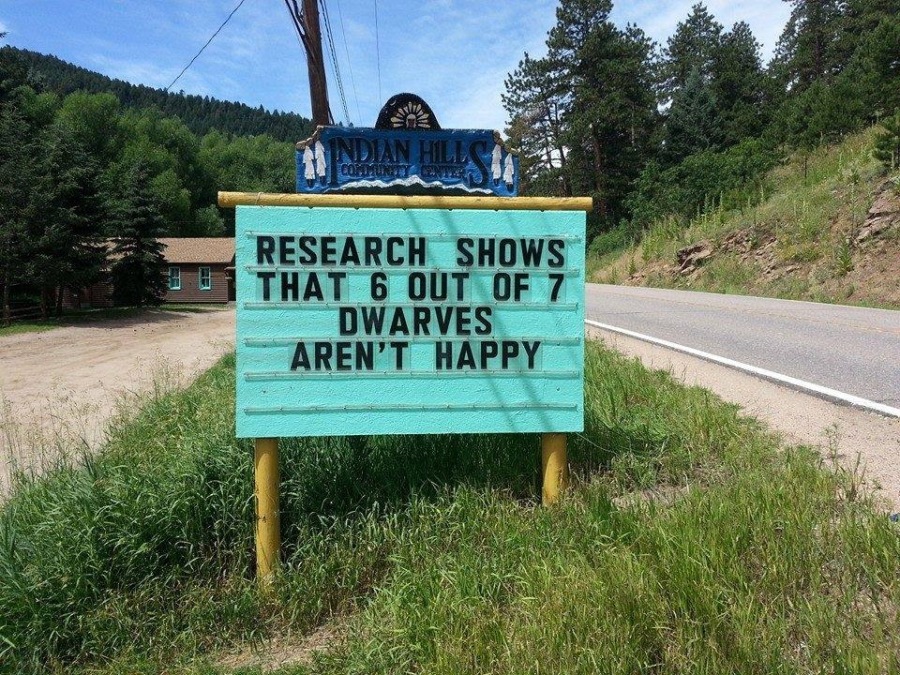American Grammar Checkup: The Devil is in the Details . . .

We can’t know if the writer doesn’t know a rule or is just trying to proof his or her own stuff (something most of us struggle with) and missing some details. What we do know is that even small errors can make a writer look careless. And who wants that?
So to help you see what I see, let’s take a little quiz to see what you find wrong in each of the following sentences. Every sentence, except one, has at least one goof in it.
Always remember: The rules here are for American grammar. Your version may be different.
- Anne felt badly about Jims situation.
- N.A.D.A stands for National Automobile Dealers Association.
- Is John really just 3-years-old?
- Bobby can’t be a 9-year old already, can he?
- Christmas Day, December 25th, 2017, will fall on a Monday, so well get a long weekend!
- Susan lives in Buzzards Bay, Ma.
- Sharon thinks Brett is a “nerd.”
- Brad has arms as big as Tom.
- The box contains: scissors, tape, and paper.
Let’s see how you did. The original errors are in BOLD, with the correction coming after them.
- Anne felt badly (bad) about Jims (Jim’s) situation. We always use “bad” when we talk about feelings (it’s just the rule), but we can certainly say we slept badly, or we drive badly. And there needs to be an apostrophe in “Jims,” because it’s a possessive word (it’s his situation).
- N.A.D.A (N.A.D.A.) stands for National Automobile Dealers Association. Many times I see abbreviations like this one missing the last period. All the letters in the abbreviation need to have the period after them.
- Is John really just 3-years-old (3 years old)? We do hyphenate ages, but not when they’re just a phrase. (See #4 for how to use the hyphens correctly.)
- Bobby can’t be a 9-year old (9-year-old) already, can he? There are two times when we do hyphenate ages: when the age is a compound adjective, modifying the word(s) after it (a 9-year-old child), and when it’s a compound noun (as above). And ALL the words in the phrase need to be connected with the hyphen.
- Christmas Day, December 25th, 2017 (December 25, 2017), will fall on a Monday, so well (we’ll) get a long weekend! We never use the th, nd, rd, or st when we have a full date that includes the year. And missing “well” is common because it’s a perfectly good word, and if we’re not paying strict attention, our eyes may skip right over it. This shows how limited spellcheck really is, right?
- Susan lives in Buzzards Bay, Ma. (Mass.) There’s no such abbreviation for Massachusetts; the only two correct ones are Mass. and MA. MA, which is the postal version, is only supposed to be used in a full address that contains a street name: 6 Smith Street, Easton, MA 02334, not in regular text.
- Sharon thinks Brett is a “nerd.” It’s a perfectly fine sentence. Periods and commas always go inside / in front of / before final quotation marks in the American system. And we always use doubles alone, never singles. Those go inside doubles.
- Brad has arms as big as Tom. (Tom’s) This one can be hard to see as wrong, because the usage is so prevalent. But Brad’s arms are not as big as Tom is — they’re as big as Tom’s arms are! Think about it. So, yes, we need to use the ’s in Tom’s name, with or without the word arms. But to avoid using the apostrophe completely, you can add the verb “does” or “has.” Brad has arms as big as Tom does (or has).
- The box contains: (contains) scissors, tape, and paper. This is another American rule (it may be used more widely than that, but I don’t know for sure), one that makes no sense. When we write a list in a sentence, we can only use the colon after a word that could logically end the sentence, and “contains” cannot do that. Neither can “include,” “includes,” or “are.” We just write the sentence without a colon, at least in that place. (FYI: If your boss doesn’t care about the rule and wants the colon in that type of sentence, fine. It’s not worth losing a job over a punctuation mark that everyone thinks belongs there anyway.)
So, how did you do? Got questions?
Are there other goofs you’ve seen that I could use in another post on this topic? I’d love to help.
If this post helped you, please share it to help others learn as well.
For more articles, visit my website: GrammarGoddess.com
"Articles from Susan 🐝 Rooks, The Grammar Goddess
View blog
Good morning, friends and colleagues! Yes, it's finally Friday again, and I hope as you're heading i ...

I’m not the first, and I’m sure I won’t be the last here on LI (or any other professional platform) ...

Sometimes I create a Funday with a theme; other times the theme comes begging to be recognized! And ...
Related professionals
You may be interested in these jobs
-
Occupational Therapist
2 days ago
Broad River Rehabilitation Newark, United StatesJob Description · Job DescriptionOccupational Therapist (OT/ OTR) · Skilled Nursing Facility in Newark, Ohio · PRN as needed during the week or on the weekends · Flexible scheduling · At Broad River Rehab we hire people who share our vision and who work diligently to provide th ...
-
Managing Director, Compliance
4 days ago
State Street Corporation Boston, MA, United StatesThe Head of Regulatory Interactions is a senior leadership position within State Street's Corporate Compliance Global Regulatory Liaison Office (GRLO). As a part of the GRLO, this role contributes to fostering a positive regulatory culture and promoting proactive interaction with ...
-

Energy efficiency expert
1 week ago
Direct apply
Diamond Dynamics Dasher, GA, United States Freelance**Introduction**: · We are looking for new energy efficiency experts** (m/f/d)** nationwide to join our consulting team in Dasher, GA. As part of our team, you will support homeowners of single and multi-family houses in their efforts to save energy costs and reduce CO2 emissions ...


Comments
Susan 🐝 Rooks, The Grammar Goddess
6 years ago #8
I agree, Martin Wright, and I have to keep remembering that a degree in some subject I know nothing about doesn't automatically mean knowledge of grammar. It probably "should," but it doesn't always.
Martin Wright
6 years ago #7
Susan 🐝 Rooks, The Grammar Goddess
6 years ago #6
Oh dear God, Ken Boddie, you are too darn funny! Don't see the point, indeed. Yes, many abbreviations have no periods at all, but when they do, the last letter needs one as well as all the others. And years ago, I had T-shirts made with "The Grammar Goddess" printed on them. I was in a supermarket, and a woman came running up to me wantng to know how many I had. Full stop indeed. I had NO idea what she was talking about. "Grammar! You have grandkids! How many!" Ohhhhhhhhhhh. Dear. No. I had to explain carefully the difference. So, yeah. It's everywhere.
Ken Boddie
6 years ago #5
Susan 🐝 Rooks, The Grammar Goddess
6 years ago #4
John Rylance
6 years ago #3
David B. Grinberg
6 years ago #2
David B. Grinberg
6 years ago #1